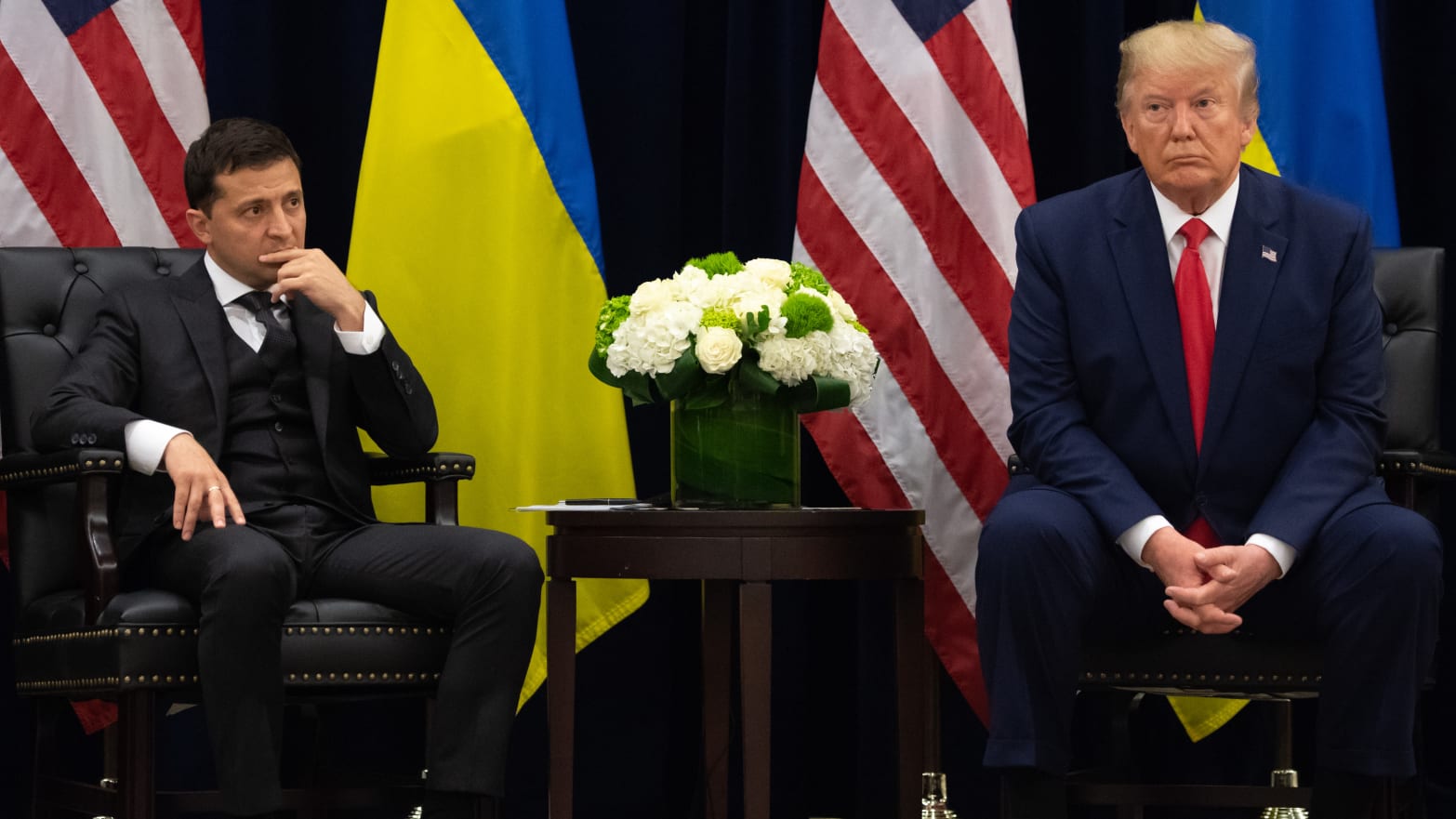The complaint was filed by an intelligence officer alarmed by details of President Trump’s July 25 calls with Ukrainian President Volodymyr Zelensky.
Allison Quinn Breaking News Reporter for the Daily Beast
Updated 09.26.19 8:56AM ET / Published 09.26.19 8:42AM ET

A redacted, declassified version of the whistleblower complaint at the center of the House’s impeachment inquiry into President Trump was made public on Thursday, revealing the anonymous intelligence officer reported his belief that Trump was “using the power of his office to solicit interference from a foreign country in the 2020 election.”
“The President’s personal lawyer, Mr. Rudolph Giuliani, is a central figure in this effort. Attorney General Barr appears to be involved as well,” the complaint says,
Acting Director of National Intelligence Joseph Maguire, who is testifying before Congress about the complaint, provided a redacted version of the complaint to lawmakers for the hearing and it was released by the House Intelligence Committee minutes earlier.
A copy of the complaint, which was made by an intelligence officer alarmed by President Donald Trump’s phone call with Ukrainian President Volodymyr Zelensky, can be read here.
Its release comes a day after the White House put out a partial transcript of the July 25 call—in which Trump reminded Zelensky that America does “a lot” for Ukraine before blatantly asking the Ukrainian leader to do him a “favor” and investigate former vice president Joe Biden and his son Hunter.
The complaint confirms a number of details that have been reported in the last week. The whistleblower writes that Trump spent the call mostly pressing Zelensky to investigate the Bidens and to locate Democratic National Committee email servers supposedly in Ukraine; he also urged the Ukranian president to work with his personal attorney Rudy Giuliani and the Attorney General Bill Barr—his “personal envoys,” in the words of the whistleblower—on the matter.
A Justice Department memo made public this week said Intelligence Community Inspector General Michael Atkinson interviewed witnesses after the complaint was filed and concluded that “statements made by the President during the call could be viewed as soliciting a foreign campaign contribution in violation of the campaign-finance laws.”
The DOJ memo said that the whistleblower did not listen in on the July 25 call but reported hearing from White House officials that Trump “had made statements that the complainant viewed as seeking to pressure that leader to take an official action to help the President’s 2020 re-election campaign.”
After receiving the complaint on Aug. 12, Atkinson conducted a “preliminary review” and found “some indicia of an arguable political bias on the part of the Complainant in favor of a rival political candidate,” the memo said. But Atkinson concluded that the complaint’s allegations “nonetheless appeared credible.”
The complaint was given to Maguire, just weeks into his tenure as acting intelligence chief, and he declined to issue a report on it to Congress. But Atkinson alerted the House Intelligence Committee of the complaint’s existence, and it subpoenaed Maguire for it.
At that point the contents of the complaint were publicly unknown, but in the coming days it was reported first that it involved Ukraine, and then that it was triggered by the July 25 call with Zelensky.
Like this? Click to receive free EnviroPolitics Blog updates
The call has fueled concerns Trump intentionally withheld $250 million in U.S. aid to Ukraine as leverage in his push for Ukrainian authorities to reopen an investigation into Biden, his potential political opponent in 2020, and investigate claims Ukrainian officials worked to help Robert Mueller.
“I would like to have the Attorney General call you or your people and I would like you to get to the bottom of it,” Trump said to Zelensky in the call. “Whatever you can do with the Attorney General would be great.”
The call also turbocharged calls for impeachment. While many Democrats have been calling for impeachment proceedings against Trump ever since the release of the Mueller Report, the whistleblower complaint proved to be the tipping point for House Speaker Nancy Pelosi, who accused Trump of a “betrayal” of his oath of office in announcing a formal impeachment inquiry on Tuesday.
While Trump apparently sought to stifle Democratic criticism by releasing the transcript of his call with Zelensky, even some Republicans seemed to think that plan backfired.
Sen. Mitt Romney (R-UT) called the transcript “troubling in the extreme,” while Sen. Ben Sasse (R-NE) told reporters “there’s obviously a lot that’s very troubling there” after viewing the whistleblower complaint.
Trump has admitted both to initially withholding aid and urging the Ukrainian president to look into Hunter Biden, who was an adviser to a Ukrainian firm, he has insisted there was no wrongdoing and no “quid pro quo.”
House Republicans were apparently concerned enough to join Democrats late Wednesday in voting 421-0 for the passage of a non-binding resolution demanding that the Trump administration release the whistleblower complaint.
Those on the House Intelligence Committee who have already seen the complaint have suggested that it offers a grim outlook for Trump.
“I found the allegations deeply disturbing. I also found them very credible,” Rep. Adam Schiff (D-CA), the chair of the House Intelligence Committee, told reporters late Wednesday.
“What this courageous individual has done is exposed serious wrongdoing. I think it a travesty that this complaint was withheld as long as it was, there was simply no basis to keep this from the committee,” he said, adding that the complaint “provides information for the committee to follow up with other witnesses and documents.”
The complaint’s release comes as the man who initially refused to give it to Congress—acting DNA Maguire—is due to appear before the House Intelligence Committee to answer lawmakers’ questions about it.
Don’t miss stories like this Click to receive free updates


